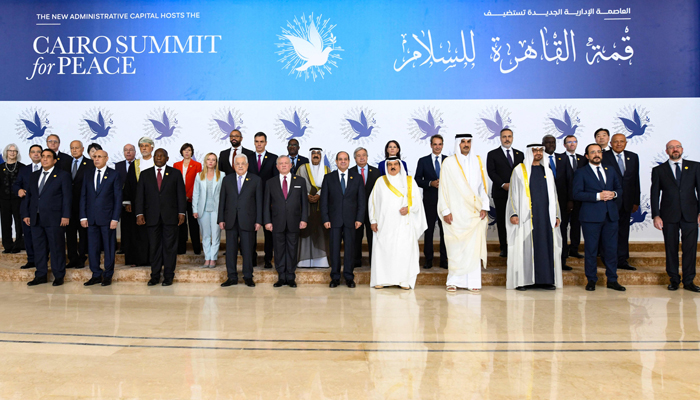Arab, Western diplomats talk past each other on Gaza
CAIRO: Cairo´s “Summit for Peace” was meant to be a diplomatic breakthrough towards a ceasefire in Gaza, but its failure revealed what one analyst called the “fault lines” between Arab and Western states on the Israeli-Palestinian conflict.
In their opening addresses on Saturday, Arab leaders and Western delegates agreed on the need for aid to reach Palestinians in Gaza, besieged and under Israeli bombardment. But after hours of discussion, they found common ground on little else, with the meeting ending without a concluding statement.
“The disagreement was over condemning Israel, which Western states refused to do,” an Arab official told AFP, requesting anonymity because they are not authorised to speak to the media. Instead, they sought a statement that placed “responsibility for the escalation on Hamas”, which Arab states refused, according to a different Arab diplomat.
Though a number of Arab leaders condemned the loss of Israeli civilian life, they refused to place the onus on Hamas for the bloodshed. Arab states -- some involved in the hostage negotiations with Hamas -- would have been “in uncomfortable positions with their people” if they had signed on to the condemnation, the Arab official said.
Another point of contention, diplomats said, was Western diplomats wanting to call for the release of hostages abducted by Hamas. Arab countries, with Qatar in the lead, have been negotiating their release in talks which could have been jeopardised if they signed alongside countries who have supported “Israel´s right to defend itself”, diplomats said.
With nothing left on the table, the meeting amounted to little more than a “dialogue of the deaf”, according to regional expert Karim Bitar, and ended quietly. The sole statement released was one from the Egyptian presidency -- drafted with the approval of Arab attendees, diplomats said -- that said decades of band-aid diplomacy had failed to find “a just and lasting solution to the Palestinian issue”.
The summit, Bitar told AFP, “perfectly illustrates the deepening fault lines between the West and the Arab world, and the Global South more broadly,” as decades have not dulled “the persistence of the Palestinian question”. Though the list of Arab states with ties to Israel has grown in recent years, popular anti-Israel sentiment has remained strong. But the idea of “drowning out the Israeli-Palestinian question in an economic mega-deal between the Gulf and Israel” turned out to be a “pipe dream”, he continued.
Since hostilities began, Iraqi Prime Minister Mohamed Shia al-Sudani -- whose government is supported by Iran-backed factions -- has condemned the “genocide” undertaken by “the Zionist occupier” on Palestinians.
-
 Travis Kelce Plays Key Role In Taylor Swift's 'Opalite' Remix
Travis Kelce Plays Key Role In Taylor Swift's 'Opalite' Remix -
 How Jennifer Aniston's 57th Birthday Went With Boyfriend Jim Curtis
How Jennifer Aniston's 57th Birthday Went With Boyfriend Jim Curtis -
 JoJo Siwa Shares Inspiring Words With Young Changemakers
JoJo Siwa Shares Inspiring Words With Young Changemakers -
 James Van Der Beek Loved Ones Breaks Silence After Fundraiser Hits $2.2M
James Van Der Beek Loved Ones Breaks Silence After Fundraiser Hits $2.2M -
 Disney’s $336m 'Snow White' Remake Ends With $170m Box Office Loss: Report
Disney’s $336m 'Snow White' Remake Ends With $170m Box Office Loss: Report -
 Travis Kelce's Mom Donna Kelce Breaks Silence On His Retirement Plans
Travis Kelce's Mom Donna Kelce Breaks Silence On His Retirement Plans -
 Premiere Date Of 'Spider-Noir' Featuring Nicolas Cage Announced
Premiere Date Of 'Spider-Noir' Featuring Nicolas Cage Announced -
 Pedro Pascal's Sister Reveals His Reaction To Her 'The Beauty' Role
Pedro Pascal's Sister Reveals His Reaction To Her 'The Beauty' Role -
 Kate Middleton Proves She's True 'children's Princess' With THIS Move
Kate Middleton Proves She's True 'children's Princess' With THIS Move -
 Paul Anka Reveals How He Raised Son Ethan Differently From His Daughters
Paul Anka Reveals How He Raised Son Ethan Differently From His Daughters -
 'A Very Special Visitor' Meets Queen Camilla At Clarence House
'A Very Special Visitor' Meets Queen Camilla At Clarence House -
 Jodie Turner Smith Shares One Strict Rule She Follows As A Mom
Jodie Turner Smith Shares One Strict Rule She Follows As A Mom -
 Hailey Bieber Reveals KEY To Balancing Motherhood With Career
Hailey Bieber Reveals KEY To Balancing Motherhood With Career -
 Photo Of Jay-Z, Other Prominent Figures With Jeffrey Epstein Proven To Be Fake
Photo Of Jay-Z, Other Prominent Figures With Jeffrey Epstein Proven To Be Fake -
 Hillary Clinton's Munich Train Video Sparks Conspiracy Theories
Hillary Clinton's Munich Train Video Sparks Conspiracy Theories -
 Fans Slam Talk Show Host For 'cringe' Behavior In Chris Hemsworth Interview
Fans Slam Talk Show Host For 'cringe' Behavior In Chris Hemsworth Interview




